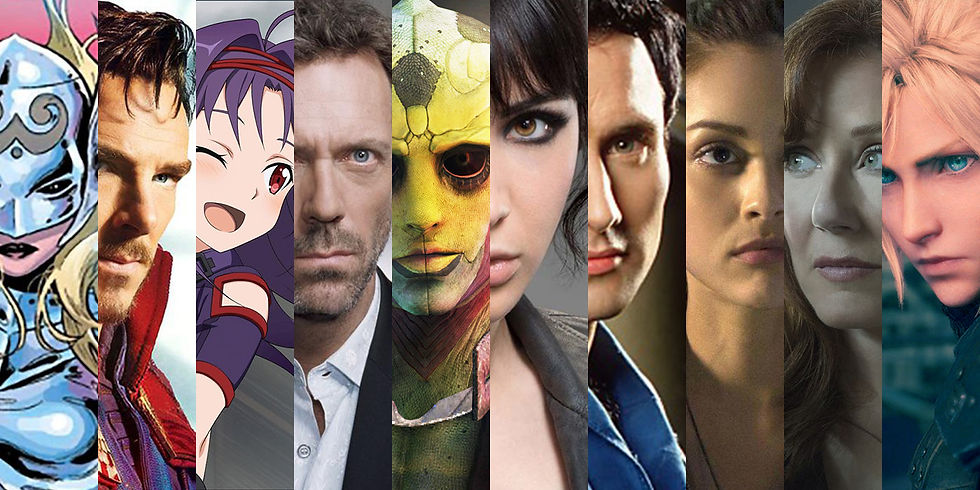How to Write a Character with Muscular Dystrophy
- Allison Alexander

- Feb 24, 2021
- 4 min read
Updated: Sep 21, 2023
An Interview with the Geeky Gimp

People look for themselves in the stories they watch, read, and hear. That’s why it’s been so exciting to see more people of colour, more females, and more sexual identities represented in books and TV. Similarly, people with disabilities and illnesses yearn to see themselves in their fictional heroes.
Representation is important, but writers often get details wrong or fall into stereotypical portrayals of characters with health conditions. To get it right, talking to people who actually have your character’s illness is paramount, and this is where my new blog series comes in!
On the blog, I feature interviews with experts on how to write disabled characters. While I still recommend getting a sensitivity reader for your work, use these posts to consider how you can accurately portray disabled characters. Today’s feature is Muscular Dystrophy with special guest, Erin Hawley (you might know her as The Geeky Gimp). Shout out to Erin for taking the time to answer my questions below!
1. How would you describe your symptoms?
“My muscles are extremely weak, and I need total care, including bathing, dressing, toileting, moving/picking up objects, feeding, etc. I use a wheelchair and sleep with a ventilator. I have a trach, and get suctioned through it to clear any congestion (how often depends on: allergies, illness – but on a good day, maybe 3 or 4 times per day). I have nurses who do much of this work, and then my parents or partner assist when I don’t have a nurse. I get muscle fatigued easily as well. I can only type for so long, or play games for so long before I have to take a break. Muscular Dystrophy itself is not painful, but I do deal with chronic pain from scoliosis, as well as from the way I sit in my wheelchair. I also have leg pains from this medicine I had to take a while ago (it’s like restless leg syndrome). Most of my pain is in my back, neck, and legs.”
2. What are some of your biggest frustrations living with this condition?
“Since I’ve been disabled my whole life, most of my frustrations are from other people’s perceptions of what my life is like, what I am able/not able to do, and systemic ableism. But I would like less pain, I would like less health-related anxiety overall.”
3. Have you seen this condition represented in media before? If so, what did they get right and/or what did they get wrong?
“Honestly, I have never seen a good portrayal of someone with MD beyond the Jerry Lewis Telethon, which is extremely ableist and relies on pity to raise money for the MDA. Disabled people want to LIVE – we don’t want people to feel pity for us. But overall, good disability rep is sorely lacking – we are often portrayed as: villains, depressed over our disability, or scary. I want to see wheelchair users who are just regular people (because we are), who date, who get angry over missing the train, who have families of their own, who attend an integrated school. I honestly can’t think of a good example off the top of my head.”
4. What are some common pitfalls or stereotypes writers should avoid?
“Oh, I guess see above 😊 Another common misconception is that we all want to be cured. Sure, I would like less pain, but I also love being disabled. You don’t see that – disability pride – depicted much in media. We are always the inspiration, and never the inspired. We have hopes, dreams, talents, faults – we are whole people, not caricatures of nondisabled people’s misconceptions. There is also a misconception that Muscular Dystrophy affects the mind as well – which I guess is technically true since the brain IS involved, but with MD, all the symptoms are with organs (heart, lungs) and the skeletal muscles. There are a BUNCH of types of MD, and each type can manifest differently. MD is not a one-size-fits-all.”
5. What are things you can’t do because of your condition?
“I can’t: see above 😃 I can: type, play games, attend events, read too much, support my family, be a loving partner, work, eat out (in the Before COVID Times), travel via train or car…there is more I can do than can’t.”
6. What advice would you give to someone who wants to accurately write about a character with this condition?
“Hire disability consultants. Hire more than one, since every disabled person has a different experience, even within the same disability. Make sure those you hire have other vectors of marginalization (SO many focus only on white cis men who are disabled).”
7. Any other thoughts, comments, or suggestions for writers?
“Writing about disability authentically is only truly possible by being disabled yourself or going through many rounds of edits by disabled people.”
Erin Hawley is a digital content producer and consultant with a focus on accessibility and disability representation in media. She has worked with companies like Microsoft, Logitech, Adobe, and Electronic Arts to ensure accessibility in not an afterthought. Erin currently works for Easterseals in the Executive and Communications departments. Her work has been featured in The New York Times, USA Today, HuffPost, and on other platforms. She lives in Keyport, New Jersey, and you can find her online under the moniker The Geeky Gimp.








Comments